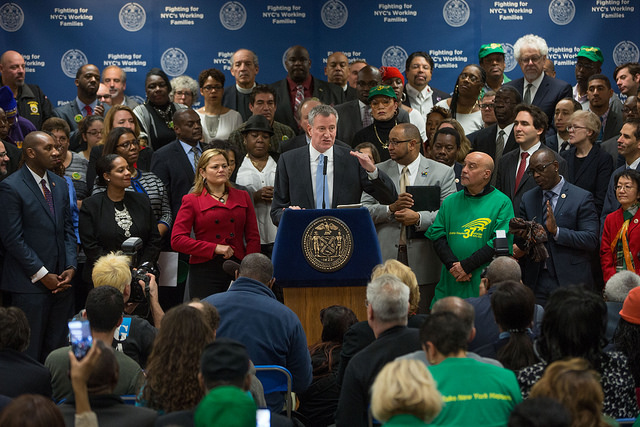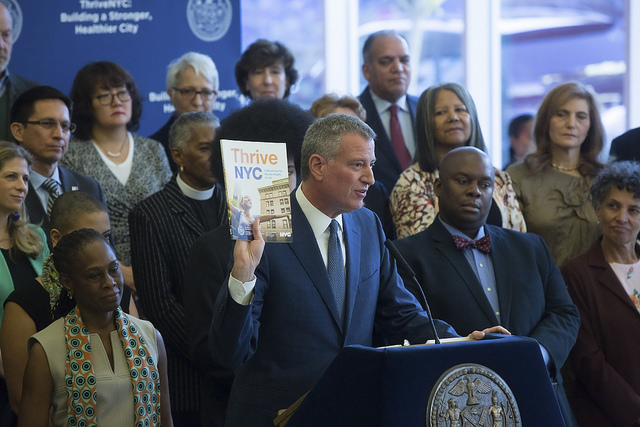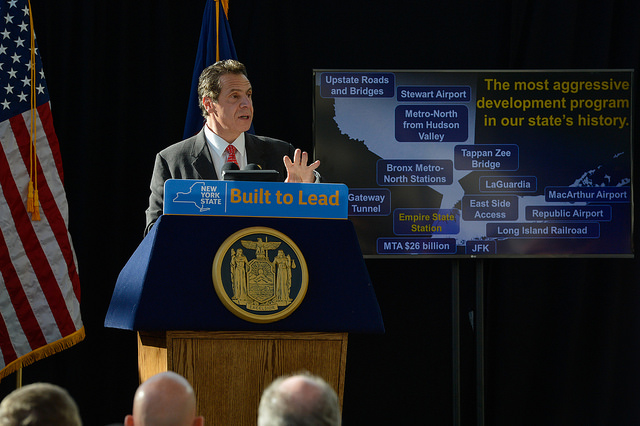More Cities Should Do What States and Federal Government Aren't on Minimum Wage

Mayor de Blasio at his recent minimum wage announcement (photo: Michael Appleton)
Early this month, New York City Mayor Bill de Blasio announced a guaranteed $15 minimum wage for all city government employees by the end of 2018. This is a big win for over 50,000 workers across the city struggling to provide for their families.
Unlike in Seattle and Los Angeles, where city officials are empowered to raise the minimum wage for the entire workforce in their cities, Mayor de Blasio is unable to unilaterally raise wages for all New York City workers. That power lies with Gov. Andrew Cuomo and the state legislature. The governor's efforts to lift the minimum wage to $15 are being hampered by a Republican-controlled state Senate.
De Blasio's decision to raise wages for city employees is a crucial independent step towards a more equitable city - and should be seen as an inspiration for cities around the nation. It also reflects the power and momentum of a groundbreaking worker-led countrywide movement demanding higher wages.
Even as state and federal administrations drag their feet on the inevitable question of a decent minimum wage for working families in the United States, de Blasio's gutsy move shows cities can and should take matters into their own hands.
The mayor's minimum wage raise closely follows his announcement last month giving six weeks paid parental leave, and up to 12 weeks when combined with existing leave, to the city's 20,000 non-unionized employees. The mayor has now moved to negotiate the same benefits with municipal unions. Again, New York City private sector workers must look to Albany or Washington, D.C. to move on paid family leave for all.
Mayor de Blasio's recent actions support his goal of lifting 800,000 New Yorkers out of poverty over ten years. More than 20 percent of the city's population lives in poverty, a huge swath of a city commonly associated with extraordinary wealth.
The last couple of years have seen unparalleled momentum from workers themselves - from New York City to Los Angeles and Chicago - calling for livable wages, resulting in minimum wage raises for fast food workers and other groups.
Workers are not waiting patiently on government officials – they are organizing in an unprecedented way. Progressive mayors like de Blasio are responding with sound policy, while less responsive officials are being put on notice. Cities like Los Angeles, New York City, and Chicago are paving the way, showing that it is possible to act independently of state and federal governments.
In addition, laws raising the minimum wage to more than the pitiful federal standard of $7.25 an hour have passed in a number of states. There are now campaigns to raise the floor and standards for workers being led in 14 states and four cities. This momentum is building into a crescendo that will have deep implications for the 2016 presidential election.
Nearly half of our country's workers earn less than $15 an hour and 43 million are forced to work or place their jobs at risk when sick or faced with a critical care-giving need. Now is the time for cities to listen to their workers and override state and federal passivity to allow millions of hard-working Americans to provide for their families.
***
JoEllen Chernow is minimum wage and paid sick days campaign director at Center for Popular Democracy. On Twitter @popdemoc.
A Case for None-Time-Limited Supportive Housing for Young Adults

Mayor de Blasio with the city's mental health plan (photo: Mike Appleton)
Recently there has been a great deal of interest in young adult supportive housing without time limits or age caps. We may be witnessing the beginning stages of a paradigm shift in which there is acknowledgement of developmental variations among youth. Both Housing and Urban Development (HUD) and United States Interagency Council on Housing (USICH) consider this as a potentially more effective approach to ending youth homelessness.
Traditionally, housing for youth has been transitional. Even when 'permanent supportive housing' is used, most programs involve length of stay limits (usually 18-24 months), and age caps meant to define true adulthood and capability to live independently without support services.
Transitional programs generally have fairly regimented guidelines with the expectation that "graduation" from the program will enable each youth to move into their own apartment and achieve self-sufficiency. However, many of these youths move in with family or friends "temporarily" or are admitted to another time-limited housing program based on their need of continued services. A large number of these youths/young adults are dealing with past trauma and may have special needs such as mental health and substance abuse issues making it difficult, if not impossible, to live independently.
At West End we believe non-time-limited affordable housing with support services onsite is another effective solution in the spectrum of services for homeless and formerly homeless youth. Our "True Colors" supportive housing programs for formerly homeless LGBT youth are new and innovative examples of this model.
Each residence consists of 30 studio apartments, community space, computer lab/resource library, and laundry facilities. West End staffs each with a program director, clinical case manager, and life skills training manager, along with 24-hour security and a live-in building superintendent.
While tenants must be 18-24 years old upon move-in, they may stay as long as they need or choose providing they comply with their rental lease agreement and basic house rules. Our service delivery involves trauma informed care and harm reduction techniques.
We chose this supportive housing model because we believe the development of independent living skills is an organic process unique to each individual and that arbitrary age and programmatic time frames do not define actual needs or abilities, especially for those who are severely traumatized by homelessness, family rejection, and loss of support.
The success of our residents speaks to the quality and appropriateness of the model. Of the original tenants at the True Colors Residence, which opened four years ago, well over half have moved on to fully independent affordable housing while others still in need of our services remain supportive housing tenants. Equally impressive is the noted decrease in substance abuse, down from 60% to 30%, as well as the reduction of unemployment from 40% to 20%.
The provision of supportive housing without time limits is an effective way to end homelessness for young adults - for more information the USICH webinar on the subject is a great resource. We are pleased by both the Mayor's and the Governor's commitment to increase the supply of supportive housing units and look forward to working with the City and State to provide housing and services for LGBT young adults in need.
***
Colleen Jackson is Chief Executive Officer of West End Residences HDFC, Inc. On Twitter @WestEndResNYC.
Don't Be Seduced By Sexy Transportation Projects

Gov. Cuomo & his infrastructure plans (photo via The Governor's Office on flickr)
We don't research and write about New York's rich transportation history because we get excited about subway tokens or World's Fair era subway cars. Rather, we seek out information to help us learn from both our past mistakes and accomplishments. The most important lesson that we have learned is that we can't backtrack on investing in our existing infrastructure.
It's easy to be seduced by projects that expand subway and rail lines, but they can't come at the expense of fixing our deteriorating and seriously underfunded transit system. It's an important message to our elected officials in Albany who have not yet approved the MTA's five-year capital program, even though it was initially proposed fifteen months ago.
The events from January 12, 35 years ago, are seared in our memories because they remind us what can happen if New Yorkers again fail to raise taxes, tolls, or fares to adequately maintain our transit network. Early that frigid 1981 morning, a train derailed when a motor fell off a subway car.
Transit officials diverted buses to carry stranded subway riders; however, there were not enough buses since 637 of them had been taken out of service because of potential cracks in their undercarriages.
That day, subway riders on virtually every line were affected by crowding and delays because one-fifth of the subway cars were stalled in subway yards by mechanical failure. Extra maintenance workers were called in but their repair work was hampered by a lack of spare parts.
Unfortunately, it was not an isolated event.
Trains were breaking down, on average, every 6,600 miles. That compares to more than 140,000 miles today. In the early 1980s, doors were broken on more than one-third of the subway cars while graffiti covered nearly every surface of the cars and stations.
Most New Yorkers either aren't old enough or haven't lived in New York long enough to remember the state of the subways in the early 1980s. That is why we find it so disconcerting when we see history repeat itself.
New Yorkers got themselves into that situation because they didn't want to raise subway fares and they prioritized expanding the transit system over maintaining the existing infrastructure. At the time, the Second Avenue subway and other aborted major expansion projects had consumed almost half of the transit system's capital budget.
The subway system has come a long way in 35 years, but it still has not come back from decades of prior neglect. In the early 1980s, the MTA embarked on a ten-year program that it had hoped would bring the entire system up to a state of good repair. Then, it could replace equipment and components on a regular basis.
Keeping a system in a state of good repair is a necessary and expensive undertaking. Few of us think about the MTA's hidden infrastructure like its aging fan plants and ventilation systems, until there is a fire. Likewise, we don't think about the subway's 400 pumping stations until the stations and tunnels are flooded during a hurricane.
To understand the MTA's need for more than five billion dollars a year to maintain its resources, just consider the system's buses. The MTA has about 5,700 buses which have a useful life of about 12 years. That means on average, the MTA needs to replace one-twelfth of its buses every year, which is about 475 buses annually. Since 40-foot buses cost about $500,000 and 60-foot buses about $750,000, the MTA needs to spend more than $250 million every single year just to replace its existing bus fleet on a regular basis.
Alas, after 30 years and spending more than $100 billion, the MTA still hasn't reached that state of good repair nirvana. Repairing and replacing equipment that goes back more than a 100 years has been far more expensive and complicated than anyone expected. The subway system still has elevators, escalators, tunnel lighting, power systems, ventilation equipment and maintenance facilities that are not in good repair.
More than 30 years of investments has transformed the transit system, but it has also put the MTA under enormous strain, because it has been paid for with more than $34 billion in loans. That is why the MTA is now spending more than 30 percent of the revenue it generates from tolls and fares to paying off its growing debt.
If the MTA doesn't get the resources it needs, transit services will suffer both in the short-term and long-term. And, allowing facilities and equipment to stay in a state of disrepair is costly because older equipment breaks down more often and requires costly repairs.
Failing to raise sufficient funds while simultaneously trying to expand the transit system got New York into a jam in the '80s. The MTA is now spending $11 billion to bring the Long Island Rail Road into Grand Central Terminal, a project that will have widespread benefits for New York, but one that has taken resources away from rehabilitating the existing system.
We want everyone to remember January 12, 1981 because the MTA is again being pulled and tugged in numerous directions to expand the system without sufficient funds to pay for them.
***
by Philip M. Plotch and Nicholas D. Bloom
Previous columns by these authors:
- The LaGuardia VaporTrain?
- JFK International: The airport New York deserves
- Good and bad news on Second Avenue subway
- Game changers for JFK International
Plotch is an assistant professor of political science and director of the Masters in Public Administration program at Saint Peter's University in Jersey City. He is the former director of World Trade Center Redevelopment and Special Projects for the Lower Manhattan Development Corporation, and the former manager of planning for New York's Metropolitan Transportation Authority. He is the author of Politics Across the Hudson: The Tappan Zee Megaproject.
Bloom is associate professor at the New York Institute of Technology where he is also Chair of Urban Administration and Interdisciplinary Studies. He has written many books including The Metropolitan Airport: JFK International and Modern New York and the forthcoming edited collection from Princeton University Press, Affordable Housing in New York: The People, Places, and Policies That Transformed a City.




